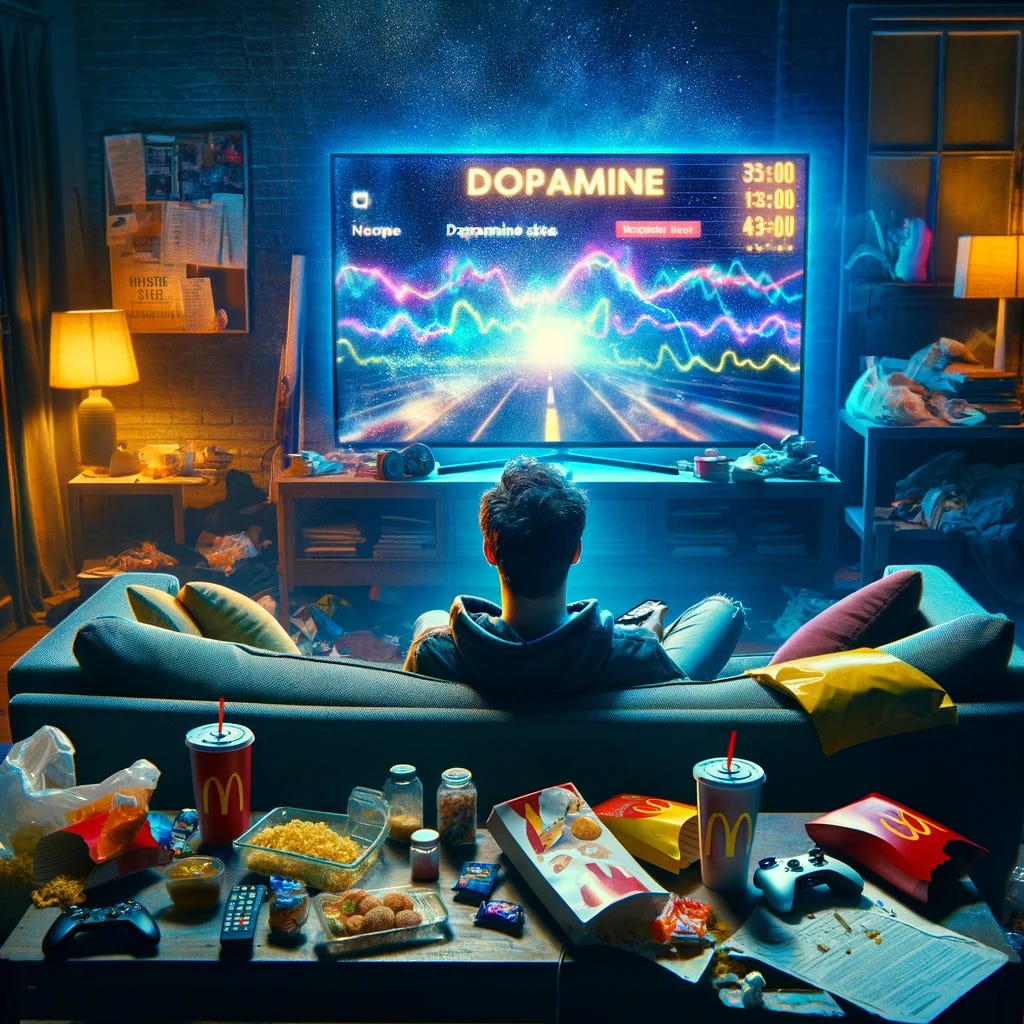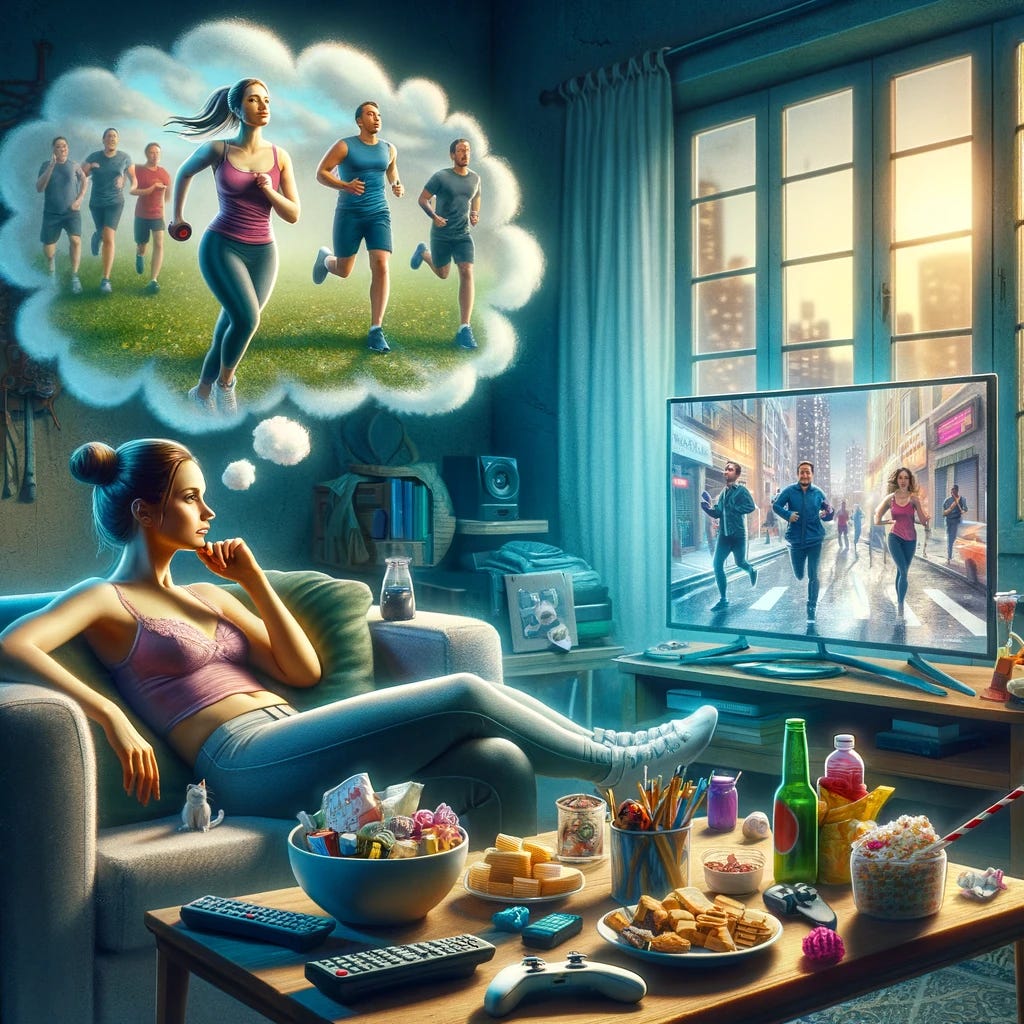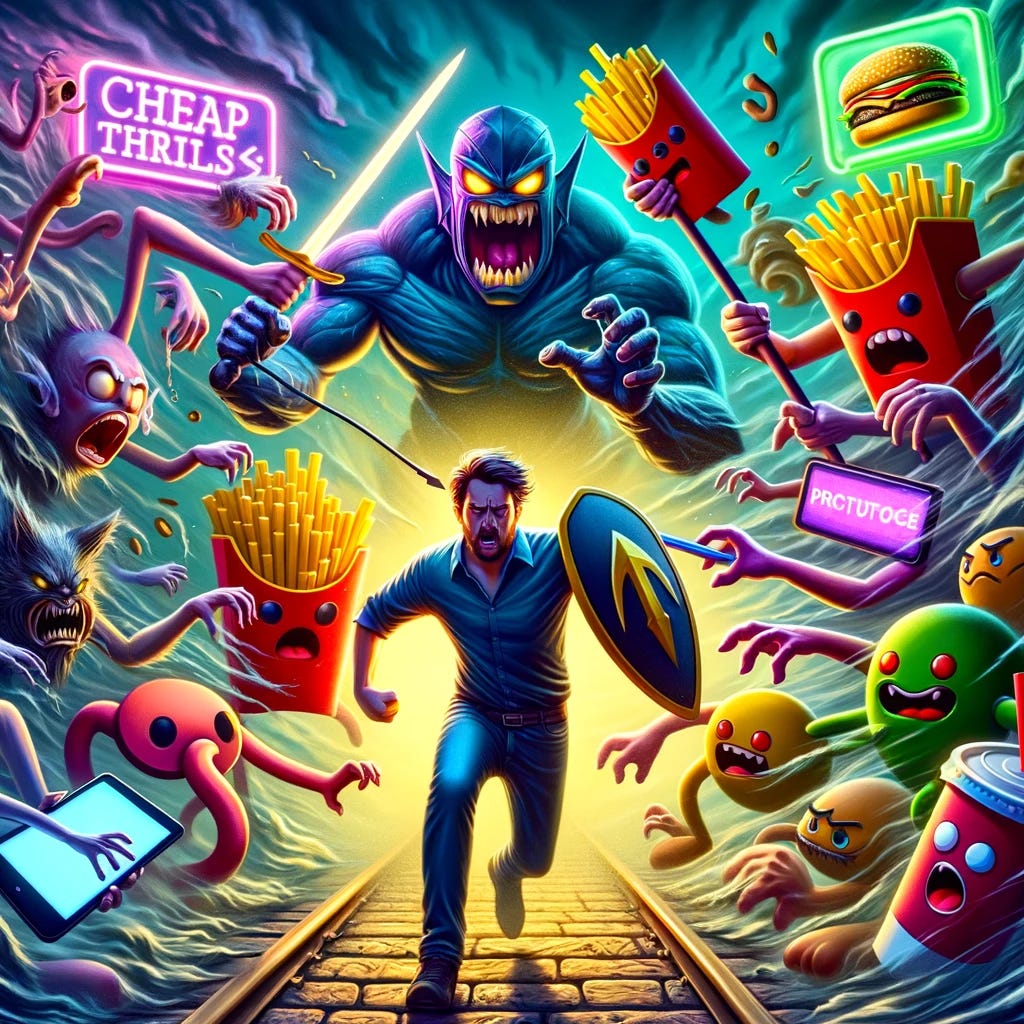- Jonathan Nott
- Posts
- Master your mind and overcome cheap thrills for a productive you.
Master your mind and overcome cheap thrills for a productive you.

Growing up as a kid, I would often be rewarded with treats if I behaved well.
Sometimes, we’d get a piece of candy if we completed a difficult task.
“If you clean your room, you’ll get a piece of chocolate.”
Kids love candy; it’s one of the most exciting experiences when you are that young.
Do something laborious or productive > receive reward > be happy. It’s a good way to encourage kids to put in effort for “hard work”.
The next time a hard task comes up, they’ll expect some reward. The dopamine system is activated, and they get excited and complete the task.
Dopamine is what motivates us to do things, it gets triggered by external input (like candy). We get excited, and if we’ve done something productive or achieved a task, there’s a feeling of accomplishment.
We feel good.
It motivates us to keep doing good things.
If a kid helps himself to the candy jar and eats all the treats, do you think they’re going to want to clean their room after experiencing a euphoric sugar high?
No, they will run around like crazy and then crash from the energy spike.
Cheap thrills.
If you keep feeding your child candy when there’s been no good behaviour, do you think they’re going to be a well-behaved kid?
No.
But if they show good behaviour, do their chores and are then rewarded at the end, they’ll be motivated to continue that behaviour.
Adults are no different, we still experience this reward system, the only problem is we are in control of the reward.
We’re emotional creatures; we don’t want to do hard work; we can just grab the candy and get that rush of excitement, right?
It is tempting to just go straight for the reward, skipping the hard work. We see the bowl of candy and go straight for it.
We’re adults, after all; life is full of hard work. A few pieces of candy are okay, now and again.
But what about the candy that we don’t see?
Human connection, challenges and goal reaching, sexual intimacy and sustenance. These activities boost our dopamine and after the experience, leave us feeling good and motivated to keep doing them.
The problem is we’ve created highly concentrated doeses of these human need dopamine triggers, without working for them, packaged them up and keep feeding ourselves daily.
Social media, excessive texting, Netflix, junk food, video games, porn, etc.
Micro hits of dopamine.
We keep feeding ourselves this daily.
Cheap thrills.
They’re not tasks that lead to productive output or “good behaviour”.
What are the benefits of eating this candy? We haven’t done anything. Most of these activities are done in a dormant sitting position.
Do you death scroll your social media feed, do you check messages, texts, group chats?
When you’re done, you probably sit in front of the TV and binge-watch the latest season of Bridgerton.

Dall-E Generated Image
Maybe you have a few things on your to-do list for the weekend, but you have a micro-moment of time, so instead you watch porn.
There’s a book you want to read, but instead, you’d rather read drama on Facebook.
Or you were invited to a dinner with friends, but the latest Fortnite update got released, that’s more exciting you tell yourself.
Cheap thrills.
All these things produce concentrated doses of dopamine, yet leave us with no motivation or accomplishment.
Play these thrills on repeat days, months, and years later. Where are you going in life?
Too much candy, kids go crazy too much cheap dopamine, you go crazy.
Like candy, dopamine is addictive; the more you have, the more you want. The more you want, the more you need.
To please the reward system, you need to compound the input. But you’re not rewarding yourself, and you’ve not achieved anything.
The simple things in life are not fun anymore:
Reading a book
Eating a banana
Going to the gym
Being out in nature
Quality time with friends
Being present thinking and meditation

Dall-E Generated Image
Enter: Anxiety/depression
You don’t feel good about yourself, you start to get annoyed at yourself because you lack motivation and don’t have any goals.
You think that everything is too hard.
Your dreams and aspirations are non-achievable.
Relatable?
Dopamine distractions are everywhere; your phone is your best and worst enemy. It’s a tool to accomplish great things, but it’s also a drug, and you’re an addict.
To achieve goals you need to fight against all the cheap thrills.

Dall-E Generated Image
You can fix this, though, it doesn’t take a long time, but it does take effort and focus.
6-Year Cheap thrills addiction, a lesson.
Recently, I discovered a journal that I had written back in 2018. It was a nice Moleskine paper journal. I wanted to start a habit of writing daily.
Only 5 pages were used…
Nice, I wanted to start something productive, but it failed.
Anyway, I saw what I wrote in there:
“I’m going to start a blog and commit to writing daily, I want to share my ideas and build an audience over time.”
Nice, I wanted to start something productive, but it failed.
Not only did I want to start a journaling habit, I also wanted to start a blog writing habit.
It’s 2024,, and I’m only doing it now.
6 years later.
6 years it took to realise I was addicted to cheap thrills that were distracting me from things I wanted to achieve.
I was distracted by all types of media: social, binge-watching netflix, and playing video games. Addicted to the instant dopamine hits they give. They left me in a cycle of feeling unproductive and so not motivated to build.
So I replaced my bad habits and cut off other ones, and now I’m more focused and consistent on my goals.
It doesn’t take 6 years, only a few days to reset your dopamine receptor, but it takes patience.
Dopamine is not about pleasure, it’s about the anticipation of pleasure. It’s about the pursuit of happiness, not the happiness itself.

Dall-E Generated Image
The benefits of the cheap thrills reset
Here’s what I’ve gained since resetting my cheap thrills addiction:
Calmness
Not distracted by impulses
Less anxiety and depression
Ability to focus in the moment
No longer death-scrolling social media
Use social media with intention and purpose
Now I get excited about the simplest of things things
Eating a banana
Reading books
Goal setting
Meditating
Building
Exercise
Writing
How do you get these benefits?
Most of these dopamine hits come from your mobile phone; the quickest way to reduce your dopamine addiction is to reduce the amount of time it lays in your hand.
It’s easy to say, “don’t look at your phone,” but that’s not practical advice; we all need to use them.
Instead, we can make our phone work for us.
Firstly
Grab a pen and paper and write out all your behaviours that are spiking dopamine but not rewarding you.
This exercise requires patience and focus, but give yourself a timer. Set it for 10 minutes and start thinking about how you are distracted by activities that don’t move you closer to your goals.
Write out anything that comes to mind; the more confronting, the better. It’s difficult to confront some thoughts, but every time you do, you win.
Secondly
Now you’ve identified all your cheap thrills triggers, it’s time to replace those with habits that bring you closer to your goals.
It’s almost impossible to just cut out your bad habits cold turkey. The most effective method to remove the habits is to replace them with a healthier alternative.
If you want to learn more about how habits work, I highly recommend reading The Power of Habit.
Let’s say one of your habits is Social Media Death Scrolling. A good activity to replace this is with reading.
When you notice the impulse to open up one of your social media apps, instead, open up your E-Book app or something like Blinkist, Imprint or Medium and read.
Don’t know what to read? What are you curious about? What’s something you’ve always wanted to learn about or a skill you want to improve?
Just do a quick Google search “Books about writing” or “Psychology books”. You’ll have a list of popular books on the topic. Most of them are less than $10, especially if they’re E-Books.
You’ll be surprised how quickly you’ll be able to replace this habit now that it is more in your consciousness.
Thirdly
Now you’ve got some momentum after the first two steps, let’s set some goals
Goal setting is important for productivity and for staying consistent.
Honestly, the thought of goal setting bores me to death; I hate the word; I hate thinking into the future and trying to determine what I want to achieve because “anything can happen” and “what if I don’t get there”.
But ultimately, it’s THE best method for leveraging good dopamine, motivation and building.
So, to get started, get writing again.
Pull out your pen and paper (by now, it’s worth investing in a Journal) and write out some goals you want to achieve.
Some of my examples:
Gain 8kg muscle mass
Gain 5k Twitter followers this year
Make $10k per month recurring income
These are all ambitious and big goals, but now you must break them down into smaller actions.
This might be tricky, but you have Google and ChatGPT to help you. Literally type in:
“How to gain 5k Twitter followers” — guaranteed there is a video online about this and how to do it.
Or ChatGPT can spit out a method, breaking it down for you.
I’ve watched a lot of videos on Twitter growth so I understand the process and have broken it down into these goals:
Tweet 3 times per day
Write 2–3 Threads per week — 30mins a day of writing
Engage with 25–50 accounts per day
Send 5 DMs per day
This method has me gaining 100 followers per week.
If I’m consistent with these goals above, I should be able to hit 5k followers within a year.
Yes, a year, it’s a long time, but I’ve set goals and broken them down, so I have motivation, and I get thrills actioning them every day because I know what I’m working towards
Clear goal = 5k followers.
Fourthly
Minimise the noise on your phone.
This one is simple, but turn off your notifications.
All my notifications on my phone are turned off, except for important apps:
Phone
Calendar
Reminders
Messaging apps: Text Message, WhatsApp
Time sensitives apps: Ride sharing, Food delivery services
Identify any other important apps you need that don’t trigger cheap thrill habits.
Summary
To summarise the main points:
You are addicted to cheap thrills; they are distracting you from achieving your goals.
Reset them by:
Identifying them through writing
Replace them with alternative habits
Set some goals that you’ve wanted to achieve
Reduce distractions by disabling notifications
It only takes a few days to reset and become a goal-setting-focused machine.
By the end of the week, you feel happier, more motivated and have increased confidence.
Keep this behaviour consistent, and you’ll be different in 6 months.

Dall-E Generated Image